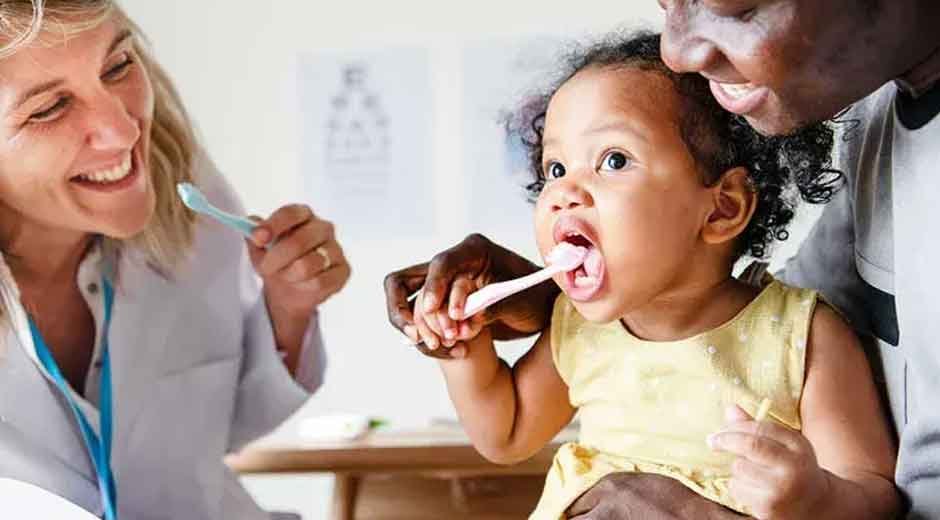Establishing a strong foundation for your child’s oral health is an important step that begins early in life. Parents often ask when they should schedule their child’s first dental visit and what they can expect from that initial appointment. Although baby teeth are temporary, they play a crucial role in a child’s development, including proper chewing, speech, and guiding permanent teeth. Early dental visits help identify potential issues before they develop into more serious problems and allow children to become familiar with dental care in a gentle, non-threatening way. We will explore the ideal timing for your child’s first dental visit and discuss key points every parent should know to prepare for this milestone and promote a positive dental experience.
Key Considerations for Your Child’s First Dental Visit
- When Is the Right Time to Schedule the First Visit?
It is generally advised that a child visit the dentist by their first birthday or within six months after the eruption of their first tooth. This recommendation may seem surprising to some parents who believe dental care can wait until a child is older. However, early visits to clinics like Kids Smiles Dentistry provide an opportunity for a professional assessment of the infant’s mouth and help parents understand the steps they can take to maintain healthy teeth and gums. Primary teeth are more vulnerable to decay because enamel is thinner and less mineralized than in adult teeth. If problems such as tooth decay develop early, they can lead to pain, infection, and difficulties with eating or speaking. Early dental visits offer a chance to establish a preventive care plan, discuss teething concerns, and receive tailored advice on oral hygiene for infants.
- Familiarizing Children With Dental Visits
Introducing a child to the dental environment at an early age helps build familiarity and reduces anxiety surrounding dental appointments in the future. Children who start dental visits as infants often have a more positive attitude toward dental care as they grow. The dentist’s approach during the first visit is usually gentle and focused on making the experience fun and stress-free. Instead of invasive procedures, the dentist may simply count teeth, examine the gums, and demonstrate how to clean a child’s mouth effectively. A friendly, relaxed atmosphere gives children the chance to get comfortable with the sights, sounds, and people in the dental office. This early introduction lays the groundwork for routine visits that focus on prevention rather than treatment.
- Preventive Guidance and Education for Parents
One of the most valuable aspects of a child’s first dental visit is the education parents receive about oral care tailored to infants and toddlers. The dentist can guide parents on how to clean their baby’s teeth and gums properly, when to begin using fluoride toothpaste, and how to avoid habits that may harm dental health, such as prolonged bottle feeding or pacifier use. Nutrition also plays an important role in oral development, and the dentist can provide recommendations on limiting sugary foods and drinks that contribute to decay. These early conversations help parents establish healthy habits for their children that will reduce the risk of cavities and other dental issues. Preventive care advice given during the first visit empowers parents to take proactive steps to maintain their child’s oral health.
- Early Detection of Dental Problems
Early dental visits are crucial for identifying dental concerns that may not be obvious to parents but could affect a child’s long-term oral health. Conditions such as early childhood caries, enamel defects, gum inflammation, or misalignment of teeth can be spotted and addressed sooner with professional care. Detecting issues at a young age increases the chances that they can be managed effectively and with less discomfort or complexity than if treatment is delayed. For example, if a child shows signs of early decay, fluoride treatments or sealants might be recommended to protect teeth. If tooth alignment appears irregular, the dentist may suggest monitoring or referrals for orthodontic evaluation. Addressing concerns early helps avoid more invasive procedures later on and supports proper oral development.
Regular visits also help a child become comfortable with the dental environment, reducing anxiety and making future appointments easier. According to these Shrewsbury dentists, when children are introduced to the dentist in a positive way, they are more likely to develop a trusting relationship with their oral care provider. This familiarity can encourage them to maintain regular checkups throughout their lives, fostering a proactive approach to their own oral hygiene.
- The Role of Parents in Preparing for the Visit
Parents have an essential role in making the first dental visit a positive experience. Preparing a child by explaining what will happen during the appointment in simple, reassuring terms helps reduce fear and uncertainty. Parents should avoid using negative or threatening language about the dentist and instead focus on the fun or helpful aspects of the visit. Bringing a familiar toy or comfort item can help soothe a child during the appointment. Selecting a dental office that welcomes young children and has an inviting, calming environment contributes to a smooth experience. Parents should also model positive attitudes toward dental care and demonstrate good oral hygiene habits at home. Being calm and supportive during the visit reassures children and encourages their cooperation.
Determining when your child should first visit the dentist is a decision that has lasting impacts on their oral health journey. Scheduling the first dental appointment by the time a child’s first tooth appears or by their first birthday is recommended to promote early prevention, detection, and education. Early visits introduce children to dental care in a positive way, helping reduce fears and set expectations for a lifetime of oral health maintenance. Parents who actively prepare their children and maintain regular check-ups provide the foundation for healthy smiles that can last throughout childhood and beyond. Taking timely action with your child’s dental visits empowers you to protect their oral health effectively from the very beginning.













